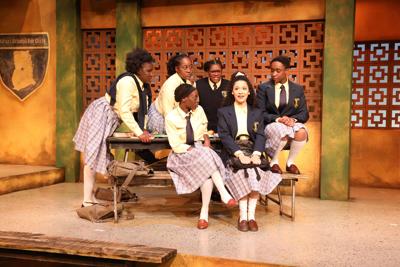Penned by Ghanaian American Jocelyn Bioh, School Girls; Or, the African Mean Girls Play is a celebration of girlhood. Nashville Repertory Theatre’s production shows that director Alicia Haymer — whose previous directing credits include work with Actors Bridge Studio, Nashville Story Garden, Street Theatre Company and Kindling Arts Festival — has come into her own.
Set in 1986 in the exclusive Abduri Boarding School in central Ghana, School Girls has a premise that is indeed similar to that of Tina Fey’s popular Mean Girls film (as well as the Broadway adaptation that just closed upstairs in TPAC’s Jackson Hall). Like Mean Girls, School Girls centers around a clique of teen girls led by a beautiful but ruthless leader. And as in Mean Girls, this clique is upended by the arrival of a new girl. But the similarities pretty much stop there — School Girls has the depth and conscience that Mean Girls has always lacked.
Headmistress Francis (the indomitable Cynthia Harris) has been preparing the girls for a beauty pageant for weeks. The winner will be crowned Miss Ghana and eligible to compete in the Miss Universe pageant. Tamiko Robinson Steele plays pageant recruiter (and Miss Ghana 1966) Eloise, whose fluorescent-pink pantsuit stands out from the earth-toned set. Eloise is in it to win — not for the girls or Abduri or even Ghana, but for her own financial gain. Golden girl Paulina (Joy Pointe) is predestined to win.

But along comes the new girl Ericka (played by the wonderful Tosha Marie), straight from exotic Ohio, USA. She is light-skinned with bouncy, defined curls and a wardrobe that the others could not even dream of owning. And a big, fat wrench is thrown into Paulina’s plans. Haymer’s casting is spot-on. By pairing local theater veterans Harris, Steele and Marie alongside emerging talent, she cultivates a set where you can tell the actors are looking out for one another. Pointe is pitch perfect as the confident leader who presides over her girl group, keeping them in check through put-downs and intimidation. Her behavior toward shy Nana (Kortney Ballenger) is especially degrading — she shames Nana for her weight and threatens to expose her for eating snacks on the sly. What Paulina lacks in decency, Nana makes up for in spades. They are accompanied by Ama (Valicia Browne), who is tired of Paulina’s dictatorship, and lovable goofballs Gifty (Ashley D. Brooks) and Mercy (Carli Hardon), whose comical naivete breaks up emotionally weighty scenes. All actors flawlessly deliver.
It has become common for a company to cast all Black actors, and our region has no shortage of talented performers. Haymer set out to direct the production with not only a cast, but a crew composed entirely of people of color. Everyone from the costume and lighting directors (Skyler Glaser and Rachael N. Blackwell) to the stage manager (Nikita Staggs) and wig stylist (Denise René Evans) are people of color. By doing so, Haymer is raising the bar for what can be accomplished in Nashville, and the results of their labor are professional, finished and contemporary.
Haymer is the second Black woman to direct a play in the Rep’s history — and the first to marshal a crew entirely made up of people of color. In her director’s note, Haymer writes that “the pressure to be perfect is a weight that many Black artists carry,” especially when they are among the first to be given an opportunity. “Once we step into those positions,” writes Haymer, “we are scrutinized harshly to be the absolute best at the thing we are attempting to accomplish. The fastest, the smartest — often with no room for error lest another Black person never get this opportunity again.”
The characters face the same kind of test. In any culture, when teen girls pin their hopes on superficial accolades, they are bound to meet disappointment. But in School Girls, there is so much more on the line. To be crowned Miss Ghana would validate them among their peers. But to be crowned Miss Universe would legitimize the potential of their entire nation in the eyes of the world. That’s a huge burden for any secondary-school student to carry. Paulina and her crew are proud African girls who are nonetheless seduced by everything American. As they face the hurdle of their internalized colorism, they must reassess the nature of beauty — and the value in themselves and each other.
It’s a very special play. And Haymer’s is a very special production. Her confident hand translates beautifully via her cast and crew, and everyone shows up with authenticity and care.







